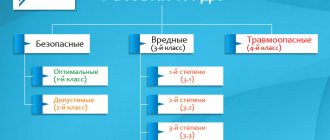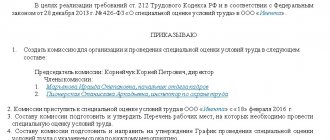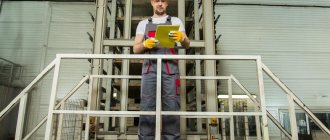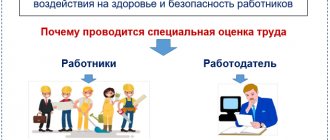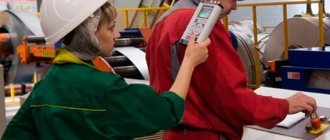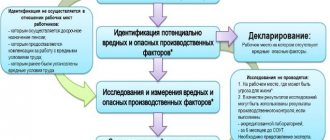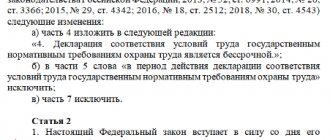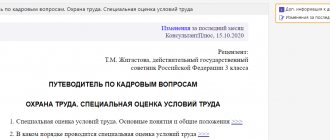The special assessment of working conditions (hereinafter referred to as SOUT) or in the old terminology “job certification” is valid for five years. Therefore, December 31, 2021 is the deadline by which the results of the “old” certification can be used. This means that companies and individual entrepreneurs that have not yet carried out the SOUT in a new way must carry out this procedure before the end of 2021. Ignoring this procedure threatens the employer with considerable fines.
LEGAL SERVICES WITH ROSCO! QUICKLY AND QUALITY!
A few words about the general rules of certification. According to labor legislation, an employee has the right to a workplace that meets state regulatory requirements for labor protection and the conditions provided for by the collective agreement (Article 21 of the Labor Code of the Russian Federation).
And the employer is obliged to ensure that a special assessment of working conditions is carried out in accordance with the legislation on special assessment of working conditions (paragraph 10, part 2, article 212 of the Labor Code of the Russian Federation).
Relations arising in connection with the implementation of special labor safety measures, as well as with the implementation of the employer’s obligation to ensure the safety of workers during their work activities and the rights of workers to workplaces that comply with state regulatory requirements for labor protection are regulated by Federal Law No. 426-FZ of December 28, 2013 “ On special assessment of working conditions”, which came into force on January 1, 2014 (hereinafter referred to as Law No. 426-FZ).
The implementation of special educational work, as well as the organization and financing is carried out at the expense of the employer (Part 1, Article 8 of Law No. 426-FZ).
The results of the SOUT are used, in particular, to provide various types of guarantees and compensations provided for by the Labor Code of the Russian Federation.
Based on the results of a special assessment of working conditions, classes (subclasses) of working conditions in the workplace are established (clause 2 of article 3 of Law No. 426-FZ). And working conditions in the workplace, as well as guarantees and compensation for work under harmful and (or) dangerous working conditions, indicating the characteristics of working conditions in the workplace, are mandatory to be included in the employment contract with the employee (Article 57 of the Labor Code of the Russian Federation).
Important!
Despite the fact that since January 1, 2014, the concept of “workplace certification” has been replaced by the term “special assessment of working conditions” (SOUT), many specialists still use the concept of “workplace certification.” In fact, despite the formal replacement of concepts, the semantic load of the terms has not changed. Therefore, the terms “job certification” and SOUT are synonymous and have the right to life.
SPECIAL ASSESSMENT OF WORKING CONDITIONS
What jobs must be certified?
As a general rule, SOUTH includes the measurement of hazardous production factors during, for example, standard production processes.
SOUTH must be carried out at all workplaces, even those where there is no “harmful” factor (for example, the workplace of an accountant, manager, director), with some exceptions (see below). In relation to workplaces that are recognized as similar, it is sufficient to carry out an assessment assessment only for 20% of such workplaces (but not less than two workplaces). Therefore, the assessment results will be distributed automatically to other workplaces (Article 9 of Law No. 426-FZ).
Important!
For example, if a company employs six auditors who are in the same room and use the same equipment (computer, printer, etc.), then their jobs can be considered similar and instead of six, only two jobs can be assessed.
The jobs of a manager and an accountant (different functionality, positions) cannot be considered similar and the 20% rule (but not less than two jobs) does not apply in this case.
The results of the conducted assessment are valid for five years and in the absence of harmful working conditions (if no changes have occurred in the workplace), the validity period of the assessment is extended. But this does not apply to workplaces with a harmful and dangerous nature of production; in relation to such places, SOUT is carried out once every five years or more often (if we are talking about an unscheduled SOUT).
TAX LAWYER CONSULTATION
Procedure for conducting a special assessment
Carrying out SOUT is charged to legal entities and individual entrepreneurs with permanent employees. The legislation allows you to check both one and the same type of work places. Monotonous places of work of office employees or cars of the same make and year of manufacture are not inspected in full; it is enough to check 2-3 objects. Based on the results of the audit, a conclusion is drawn on all inspected objects.
To determine the number of objects to be surveyed, their location (near a window, in the basement, in the open air, etc.) and the environment (presence of air conditioning, quality of lighting, heating, etc.) also influence. If it is possible to group workplaces based on similar characteristics, they can also be surveyed individually.
They do not require an assessment of the working conditions of non-staff personnel, people engaged in home work, or personal vehicles used for official purposes.
When is it possible not to conduct workplace certification?
Workplace certification is not carried out in relation to:
- vacant jobs (since production processes are not carried out, the SOUT is not needed, which is confirmed by the letter of the Ministry of Labor of the Russian Federation dated March 14, 2016 No. 15-1/OOG-1041);
- in relation to the working conditions of homeworkers, remote workers and workers who have entered into employment relationships with employers - individuals who are not individual entrepreneurs (Clause 3 of Article 3 of Law No. 426-FZ).
Registration of the results of the special assessment
Based on the results of the SOUT, a report is drawn up (Article 15 of Law No. 426-FZ), which includes:
- Information about the organization that conducted the SOUT
- List of inspected workplaces indicating the identified harmful (hazardous) factors.
- Protocols of the conducted studies.
- Information about classes of working conditions for workplaces.
- A protocol for assessing the effectiveness of the protective equipment used in those workplaces where it is necessary.
- List of occupational safety measures.
The report must be signed by all members of the commission and approved by its chairman.
Frequency of certification
As a general rule, special assessment and assessment should be carried out at least once every five years (clause 4 of article 8 of Law No. 426-FZ). In this case, it is necessary to take into account special rules for the following cases:
- if the certification of workplaces was carried out before the entry into force of Law No. 426-FZ. Then 5 years are calculated from the date of the last workplace certification carried out by the employer before 01/01/2014.
- in relation to workplaces not specified in paragraph 6 of Article 27 of Law No. 426-FZ, the employer has the right to conduct it until December 31, 2018, which is confirmed by judicial practice (Decision of the Arkhangelsk Regional Court dated March 9, 2017 No. 7R- 143/2017).
Important!
Thus, if companies or individual entrepreneurs last carried out certification before 2013 inclusive, they must carry it out before the end of 2021, otherwise fines cannot be avoided.
From January 1, 2021, the “old” certification cards for special assessment of working conditions are no longer valid. Employers need to have SOUT results according to the rules established by Law No. 426-FZ.
Companies and individual entrepreneurs that have begun a phased assessment of working conditions must also complete it by the end of 2021.
STAFF RECRUITMENT
Legal basis of special assessment
As mentioned above, a special assessment of working conditions (hereinafter referred to as SOUT) is provided for by the Labor Code of the Russian Federation, namely, Art. 212. But the code only establishes the obligation for employers to carry it out, without providing any specific information.
All issues related to the conduct of SOUT are reflected in detail in the law dated December 28, 2013 No. 426-FZ “On special assessment of working conditions” and in the methodology approved by Order of the Ministry of Labor dated January 24, 2014 No. 33n.
The law establishes the general procedure for organizing and conducting special labor assessments, and the methodology contains specific techniques and criteria used in assessing workplaces.
Let us consider in detail the procedure for conducting a special assessment of working conditions.
Unscheduled certification of workplaces
In a number of cases, employers are required to carry out unscheduled special labor and safety work (Article 17 of Law No. 426-FZ, letter of the Russian Labor Ministry dated November 20, 2015 No. 2628-6-1 “On working conditions in the workplace”). For example, this is necessary when changing the technological process, replacing production equipment, which can affect the level of exposure to harmful and (or) hazardous production factors on workers.
In addition, the need to conduct an unscheduled SOUT arises when:
- new jobs are created;
- the employer received orders from the state labor inspector to conduct an unscheduled special labor inspection (for example, they previously committed violations of labor legislation);
- the composition of the materials used and (or) raw materials that can influence the level of exposure to harmful and (or) hazardous production factors on workers changes;
- the applied personal and collective protective equipment is changing, which can influence the level of exposure to harmful and (or) hazardous production factors on workers;
- an industrial accident occurred at the workplace (with the exception of an industrial accident that occurred due to the fault of third parties) or an occupational disease was discovered, the causes of which were the employee’s exposure to harmful and (or) dangerous production factors;
- this is required by a trade union or other representative body of workers.
Important!
Unscheduled certification is carried out at the relevant workplaces within six months from the date of occurrence of these cases.
Identification and measurement of harmful (hazardous) factors
The SOUTH procedure itself begins with the identification of harmful or dangerous production factors. The methodology for conducting a special assessment of working conditions includes:
- Microclimate (temperature, humidity, pressure).
- Radiations of various types (including ionizing).
- Physical factors (noise, vibration)
- Chemical and biological factors.
Identification is carried out by an expert from a specialized organization, and then approved by a commission created by the employer.
If harmful (hazardous) factors have been identified, they must be measured and classified. The assessment procedure and standard values are reflected in the Methodology for conducting a special assessment of working conditions No. 33n.
Based on the assessment results, jobs are divided into four classes:
- Optimal (class 1) – there are no undesirable factors or their influence is within safe standards.
- Acceptable (class 2) - the impact of factors can be neutralized during normal rest after finishing work.
- Harmful (class 3) – exposure to factors can lead to the development of occupational diseases; long rest is required for recovery. This class is divided into 4 degrees, depending on the intensity of exposure to harmful working conditions.
- Hazardous (class 4) – factors pose a threat to the life of an employee or can lead to the development of acute occupational diseases.
Stages of workplace certification
Stage 1. Search for a specialized company.
The employer carries out special assessment work together with a specialized organization engaged under a civil law agreement (clause 2 of article 8 of Law No. 426-FZ).
Important!
Not every organization can carry out SOUT. Requirements for such organizations are specified in Article 19 of Law No. 426-FZ. The list of organizations authorized to carry out SOUT is presented on the website of the Ministry of Labor of the Russian Federation ().
And the employer, when choosing an organization to conduct special labor safety measures, must make sure that it is included in the register of accredited organizations providing services in the field of labor protection.
Conducting an assessment assessment by an organization that does not meet the requirements of Article 19 of Law No. 426-FZ will lead to the recognition of the assessment report as invalid.
HR AUDIT
Stage 2. Formation of an internal commission for conducting special assessment and issuance of an order to conduct special assessment.
The order specifies the members of the commission (at least 3 people), determines the list of jobs for which certification is carried out, and establishes a schedule for conducting a special assessment.
Stage 3. Familiarization with the results of the SOUT carried out by a specialized company and preparation of the necessary documentation (report, act of completion of work, certification cards, etc.).
It is necessary to pay attention to the date of preparation and approval of the workplace certification report, since the completion date of the SOUT is the date of approval of the report - no later than December 31, 2021.
Stage 4. Familiarization of workers with the results of special labor safety measures and provision of additional guarantees and compensation (if working conditions were found to be harmful or dangerous).
From the date of approval of the SAW report, it is necessary to familiarize employees with the results of the assessment of their jobs within 30 calendar days. The specified period does not include periods of temporary incapacity for work of the employee, being on vacation or a business trip, periods of rest between shifts (Clause 5 of Article 15 of Law No. 426-FZ).
As practice shows, not all workers and employers agree with the results of the SAW. In the first case, the employee may lose a number of benefits and compensation, and in the second, the establishment of a high class necessitates the provision of benefits to the employee.
An employee who believes that his rights were violated during the special assessment work has the right to appeal the results of the special assessment in court (Article 5 of Law No. 426-FZ). In addition, before making a decision to conclude an employment contract, the employee must have reliable, updated information about the working conditions at his workplace. He can obtain such information only based on the results of a special assessment of working conditions from the card of a special assessment of working conditions of the workplace that will be provided to him (Decision of the Kemerovo Regional Court dated January 18, 2017 No. 21-7/2017).
HR SERVICES
Stage 5. Posting information about the conducted special assessment on the website of the company or individual entrepreneur (if available).
On the website of the company or individual entrepreneur, the results of the SOUT are posted, data on classes and subclasses of working conditions in the workplace are provided, as well as a list of measures to improve working conditions in the workplace.
Stage 6. Submitting a declaration of compliance of working conditions with standards to the labor inspectorate.
The declaration of compliance of working conditions with state regulatory requirements for labor protection is drawn up only in the form approved. Order of the Ministry of Labor of the Russian Federation dated 02/07/2014 No. 80n and is filled out on the basis of a report on the implementation of special assessment and assessment work.
The declaration indicates only those jobs that are recognized as optimal (class 1) or acceptable (class 2).
The deadline for filing the declaration is no later than 30 working days from the date of approval of the report by the employer.
Reflection of certification costs in tax and insurance reporting
Expenses for conducting special tax assessments are taken into account as other expenses (clause 7, clause 1, article 264 of the Tax Code of the Russian Federation) for taxpayers applying the general taxation regime.
“Simplers” cannot take such expenses into account due to the absence of such expenses in the closed list of expenses (clause 1 of Article 346.16 of the Tax Code of the Russian Federation, letters of the Federal Tax Service of the Russian Federation dated July 30, 2014 No. GD-4-3/14877 and the Ministry of Finance of the Russian Federation dated June 30, 2014 No. 03-11-09/31528).
In “insurance” reporting (in form 4-FSS, which is submitted to the territorial department of social insurance), the results of the SOUT are reflected in table 5 of form 4-FSS for the first quarter of 2021.
In terms of contributions to pension insurance, SOUT affects the additional tariff if harmful or dangerous working conditions are established.
DRAFTING AN EMPLOYMENT CONTRACT
Preparation for carrying out SOUT
The law assigns responsibilities for organizing and financing SOUT to the employer (Article 8 of Law No. 426-FZ).
For this purpose, a commission is created, the formation of which is subject to certain requirements (clauses 1-4 of Article 9 of Law No. 426-FZ):
- The number of commission members must be odd.
- The commission must be headed by a representative of the employer.
- The commission must include a labor protection specialist (full-time or working under a civil contract).
- If the enterprise has a trade union organization or other elected body of workers, then its representatives must also be part of the commission.
Next, as part of the preparation for the SOUT, you need to determine the list of jobs that will be assessed. When creating this list, it is important to correctly determine which jobs are similar. By similar we mean workplaces located in the same type of premises with the same working conditions, in which workers perform the same labor functions (Clause 6, Article 9 of Law No. 426-FZ).
If there are such places at the enterprise, then you can evaluate 20% of the places from each “group” (but not less than two). The results of the sample assessment apply to all workplaces in this group.
Fines for lack of certification of workplaces
Violation of the procedure for certification of workplaces or failure to carry it out entails (Part 2 of Article 5.27.1 of the Code of Administrative Offenses of the Russian Federation):
- warning or fine for officials from 5,000 to 10,000 rubles;
- fine for the employer-entrepreneur from 5,000 to 10,000 rubles;
- fine for the employer - company from 60,000 rubles to 80,000 rubles.
At the same time, the maximum amount of the fine (for a company - 80 thousand rubles) does not depend on the number of workplaces for which SOUT was not carried out (letter of the Rostrud of the Russian Federation dated November 28, 2016 No. PG/31983-03-3).
This means that if a company has not carried out special assessments for, for example, 2 out of 15 workplaces, then the maximum fine will be no more than 80,000 rubles.
Repeated violation entails the imposition of an administrative fine:
- against officials in the amount of thirty thousand to forty thousand rubles or disqualification for a period of one to three years;
- for legal entities - from one hundred thousand to two hundred thousand rubles or administrative suspension of activities for a period of up to ninety days.
Important!
In accordance with Art. 57 of the Labor Code of the Russian Federation, working conditions in the workplace are mandatory for inclusion in the employment contract. In this case, the determination of working conditions should be carried out on the basis of the results of a special assessment of working conditions.
In accordance with Part 4 of Art. 5.27 of the Code of Administrative Offenses of the Russian Federation, improper execution of an employment contract (including the absence of working conditions) entails the imposition of an administrative fine for each improperly executed employment contract:
- for officials in the amount of 10,000 to 20,000 rubles;
- for legal entities - from 50,000 to 100,000 rubles.
Repeated violation entails the imposition of administrative penalties:
- for officials - disqualification for a period of one to three years;
- for legal entities - from one hundred thousand to two hundred thousand rubles.
Conclusion
: the absence of SOUT entails administrative liability under two articles of the Code of Administrative Offenses simultaneously with the imposition of a fine under Article 5.27 and 5.27.1.
TAXES WHEN ISSUING MILK TO EMPLOYEES “FOR HARMFUL”
Preparatory stage
Before assessing working conditions, it is necessary to verify the authority of the control organization. To do this, find out:
Presence of the relevant type of activity in the organization’s charter;
Are there experts among the employees of the inspection institution who are certified to carry out special labor assessments;
Availability of an accredited laboratory for the analysis of hazardous production factors.
Following the selection of the inspection organization, it is necessary to draw up an agreement on the basis of which the examination is carried out. The contract should include the following information:
- Timing of research activities;
- List of rights and obligations of the parties;
- Payment method and full cost of verification;
- Responsibility for failure to comply with the terms of the contract;
- Warranty period for SOUT.
After the contract is concluded, the controlling organization will be able to begin the examination.
